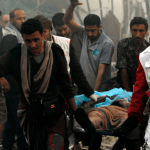The Trump administration’s move on May 24 to authorize emergency arms sales to Saudi Arabia, the United Arab Emirates, and Jordan is bad news for the already grievously suffering population of Yemen. The administration justifies those arms – including bombs, precision-guided munitions, drones, and repair and maintenance services for the Saudi air fleet – as necessary to counter Iran’s regional “malign influence.” But it’s much more likely that they will be deployed in the Yemen conflict in ways that pose a deadly danger to Yemeni civilians.
A New York Times exposé last week shone a light on that aspect of the Yemeni war, one that Saudi Arabia and the Trump administration would likely prefer we ignore: lethal airstrikes on hospitals and other health care facilities by the Saudi-Emirati-led coalition, using U.S. military armaments and ordnance and supported by U.S. training and intelligence. That report highlighted an almost casual commission of war crimes – attacks on medical facilities despite vivid markings on hospital roofs identifying their medical purpose and the existence of a “no strike list,” which is an index of permanently deconflicted humanitarian sites managed by the UN Office for the Coordination of Humanitarian Affairs. This list supposedly prohibits attacks on known medical facilities by parties to the conflict.
The New York Times report is dismaying, but not surprising.
Physicians for Human Rights (PHR) has been monitoring and verifying the targeting of health care facilities and the failure to take appropriate measures to shield them from attacks during the past 16 months by both the Saudi-Emirati-led coalition and the insurgent Houthis. In that period, PHR has independently confirmed more than 23 individual attacks on health facilities. Hospitals and clinics have been bombarded, shelled, overrun, and put out of service. These attacks include Saudi-Emirati-led coalition air strikes that destroyed a clearly demarcated Doctors Without Borders clinic in the town of Abs on June 11, 2018 as well as an October 11, 2018 airstrike that severely damaged a hospital in ad-Durayhimi.
The aerial bombardment of medical facilities by the Saudi coalition is causing significant long-term damage to Yemen’s fragile health infrastructure. Meanwhile, indiscriminate land bombardments, the occupation of medical facilities, the restriction of access to medical aid and supplies, and multiple incidents of assaults on medical personnel have all caused medical facilities to become unsafe. About 50 percent of hospitals and health facilities in Yemen continue to be out of service or functioning partially. Health care remains largely inaccessible, with many civilians having to travel long and often dangerous distances to access basic medical services.
The human cost of these attacks is unconscionable. In the context of an extremely vulnerable population and a health care system already reeling under the weight of the conflict, the consequences of such purposeful attacks on public health cannot be overstated. These attacks have coincided with multiple cholera outbreaks that have affected an estimated 1.16 million Yemenis. Despite cholera being a treatable disease, thousands of people have already succumbed to the illness, nearly a third of whom were children.
PHR has repeatedly called for a concerted international effort to halt attacks on civilians, has urged countries providing arms to the belligerents to make every effort to ensure that these are not used against civilians and civilian infrastructure, and has pushed for independent investigations into gross violations of international humanitarian law and human rights. However, as the conflict has deepened and the resultant humanitarian disaster expanded, such calls by PHR and others have increasingly rung hollow, especially with those Western governments largely supportive of the Saudi-Emirati-led coalition. Despite the public outcry over the actions of coalition members and the political momentum to counter these actions that built up in the wake of the October 2018 Khashoggi murder – including a bipartisan vote by Congress to end U.S. involvement in Yemen – the Saudi-Emirati-led coalition continues to prosecute the war in Yemen in complete disregard of its obligations to prevent harm to civilians.
The Trump administration has unapologetically supported the Saudi involvement in Yemen despite the staggering human toll it has inflicted on that country’s civilian population. By announcing its plan to bypass Congress with an “emergency” provision to the Arms Export Control Act, the administration has opted for a legally dubious measure to circumvent the constitutional authority of a bipartisan Congress which stands in opposition to such sales. The weapons sold by the United States government to members of the coalition help perpetuate the conflict and the unlawful attacks on civilians and health facilities that define it. The Trump administration should prioritize the lives of Yemeni civilians over blind support for perceived regional allies who are shredding international norms by pursuing a conflict in Yemen that is characterized by a grisly litany of war crimes. Suspending armament sales to Saudi Arabia, the Emirates, and their allies will send an overdue message that the Trump administration will no longer be complicit in the criminality of the Yemen conflict. Failure to do so will relegate the United States to the status of an enabler of the ongoing depredation of Yemen and the death of thousands of its civilians.
Physicians for Human Rights (PHR) is a New York-based advocacy organization that uses science and medicine to prevent mass atrocities and severe human rights violations. Learn more here.

